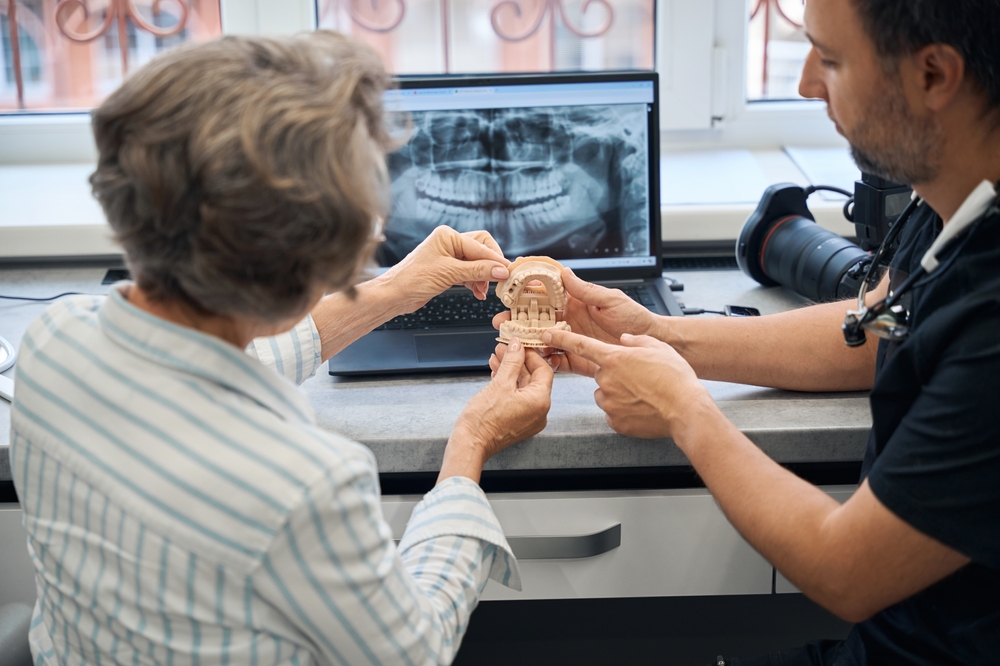
Aftercare Guide: Recovery Tips for Dental Implants & Bone Grafts in Glendale
Recovering from dental implant or bone graft surgery is a vital part of achieving a healthy, long-lasting smile. At Infinite Dental Wellness, we know that what you do after you leave our Glendale office matters just as much as the procedure itself. Proper aftercare helps your body heal efficiently, reduces discomfort, and ensures your new implants or bone graft can successfully set the stage for a lifetime of confident smiles.
Whether you received a single implant to replace one tooth or a full-mouth restoration to transform your entire smile, the recovery process follows a similar path. It centers on gentle care, patience, and close attention to the instructions we provide. Taking these steps carefully will promote a smooth and comfortable healing experience.
What to Expect After Dental Implant or Bone Graft Surgery
Following your procedure, it is completely normal to experience some temporary and mild side effects as your body begins its natural healing process. Most of our Glendale patients report some swelling, bruising, and minor tenderness around the surgical site for the first few days. This is a sign that your body is sending healing resources to the area. These symptoms typically peak within 48 to 72 hours and then begin to fade steadily.
The dental implant healing timeline varies from person to person, but the initial phase is the most critical. At Infinite Dental Wellness, we ensure you leave our office with a detailed set of personalized care instructions. We will walk you through every step, from managing discomfort to cleaning the area, so you feel confident and prepared for a smooth dental implant recovery in Glendale. A little bit of rest and careful attention during this period go a long way in ensuring decades of success.
Immediate Recovery Tips for a Smooth Healing Process
The first 48 hours after your surgery are foundational for a successful recovery. Your main goals are to manage comfort, protect the delicate surgical site, and create an optimal environment for healing.
1. Manage Swelling and Discomfort Gently
Managing post-operative swelling and discomfort is straightforward. Applying a cold compress or ice pack to the outside of your cheek for 15-20 minutes at a time during the first 24-48 hours can significantly reduce swelling and soothe the area. You can repeat this throughout the day.
Any discomfort you feel can usually be managed effectively with over-the-counter pain relievers like ibuprofen or acetaminophen. We will provide specific recommendations based on your health history. It’s also important to get plenty of rest. Plan on taking it easy and avoiding any strenuous activity, exercise, or heavy lifting for at least the first two days to allow your body to focus its energy on healing.
2. Protect the Surgical Site
The surgical site is very delicate in the first few days. It's crucial to avoid disturbing it. Do not touch the area with your fingers or tongue. You should also avoid vigorous rinsing, spitting, or drinking through a straw, as the suction can dislodge the protective blood clot that forms over the site, a condition known as dry socket.
When you go to sleep, try to keep your head slightly elevated with an extra pillow. This can help minimize swelling overnight. Our implant dentist in Glendale will provide specific cleaning instructions, but the general rule is to be as gentle as possible.
3. Stay Hydrated and Avoid Smoking or Alcohol
Proper hydration is essential for healing, so be sure to drink plenty of water. However, it is just as important to avoid certain habits that can interfere with recovery. Smoking is one of the biggest risks to a healing implant or bone graft. It restricts blood flow, which deprives the surgical site of the oxygen and nutrients it needs to heal properly, and dramatically increases the risk of infection and implant failure.
Alcohol can also hinder healing, interfere with medications, and contribute to dehydration. We strongly advise all our patients to refrain from smoking and drinking alcohol throughout the primary healing period.
What to Eat After Dental Implants or Bone Grafting
Your diet plays a surprisingly important role in your recovery. Eating the right foods provides your body with the nutrients it needs to heal, while avoiding the wrong foods protects the surgical site from irritation or damage.
The First 48 Hours
For the first day or two, your diet should consist of cool liquids and very soft, smooth foods that require no chewing. This prevents you from accidentally biting down on or irritating the surgical area. Excellent choices include:
- Cool soups (not hot)
- Smoothies (without seeds, and do not use a straw)
- Yogurt
- Pudding or Jell-O
- Applesauce
- Meal replacement shakes
Week One and Beyond
After the first couple of days, as you start to feel more comfortable, you can gradually introduce more substantial soft foods. The key is to continue avoiding anything hard, crunchy, sticky, or spicy that could disturb the healing tissues. Good options for the first week include:
- Mashed potatoes or mashed sweet potatoes
- Scrambled eggs
- Oatmeal or cream of wheat
- Soft, flaky fish
- Cottage cheese
- Steamed, soft vegetables
Most of our Glendale patients find they can slowly return to a more normal diet as the weeks progress. Listen to your body and don’t rush it. The temporary dietary change is a small but critical part of your successful dental implant healing in Glendale.
Oral Hygiene and Gum Care During Recovery
Keeping your mouth clean after surgery is essential for preventing infection and ensuring your implant or graft heals properly. However, it must be done with extreme care. You can continue to brush your other teeth as you normally would, but you must avoid the surgical site itself.
For the first 24 hours, do not rinse your mouth at all. After that, we will likely recommend a gentle saltwater rinse (a half teaspoon of salt in a glass of warm water) or a prescribed antimicrobial mouthwash. When you rinse, don't swish vigorously. Instead, gently tilt your head from side to side to allow the rinse to flow over the area, then let the water fall out of your mouth into the sink. Do not spit. You can typically resume very gentle brushing around the area after a week or so, once cleared by your dentist.
Why Gum Health Matters for Long-Term Success
Healthy gums are the protective barrier for your new implants. Gum care after implants is not just about the immediate recovery period; it’s a lifelong commitment. Healthy gum tissue forms a tight seal around the implant post, protecting the underlying bone from bacteria and infection. Untreated gum inflammation can lead to peri-implantitis, a condition similar to gum disease that can cause bone loss around the implant and lead to its failure. This is why proper implant maintenance in Glendale is so important for the longevity of your new smile.
Long-Term Implant Care and Maintenance
One of the best things about dental implants is that once they are fully healed, you can care for them much like you would your natural teeth. There are no special adhesives or nightly soaking rituals. Your long-term success depends on a simple but consistent routine of excellent oral hygiene and regular professional care.
This includes brushing twice a day with a soft-bristled toothbrush and flossing daily. We may recommend special tools like a water flosser or interdental brushes to help you clean effectively around the implant bridge. Paired with routine dental cleanings and check-ups, this simple maintenance can help your implants last a lifetime.
Follow-Up Visits in Glendale
Follow-up appointments are a critical part of your aftercare plan. They allow us to monitor your healing, make sure everything is progressing as it should, and catch any potential issues early. Your schedule will typically include:
- A post-operative check about one to two weeks after surgery to examine the site and remove any sutures.
- A follow-up visit after a few months to check on the implant’s integration with the bone.
- Regular annual check-ups and cleanings to ensure the long-term health of your implants and gums.
We are proud to serve patients from across Glendale, Montrose, Burbank, and Pasadena, providing convenient and comprehensive follow-up care to protect their investment in their smile.
Glendale Lifestyle Tips for Comfortable Healing
Your environment and daily habits can support a more comfortable recovery. In the first few days, plan to rest at home. Staying cool indoors is helpful, especially on warm Glendale days. When you do go outside, avoid direct sun exposure.
As you begin to feel better, light activity is encouraged. Many of our Glendale patients enjoy taking gentle walks through beautiful local spots like Verdugo Park once they feel up to it, as light movement can promote circulation and healing. Above all, listen to your body. If you feel tired, rest. This supportive, personalized care is a hallmark of our whole-body wellness approach.
When to Contact Your Glendale Dentist
It's important to know the difference between normal healing symptoms and signs of a potential complication.
Normal symptoms include:
- Mild to moderate swelling and bruising for the first few days.
- Minor tenderness at the surgical site.
- A small amount of bleeding or oozing within the first 24 hours.
You should contact our Glendale office if you experience:
- Pain that is severe or gets worse after three days.
- Bleeding that is heavy or doesn’t stop with pressure.
- Swelling that continues to increase after 72 hours.
- A fever or signs of infection, such as pus from the surgical site.
Never hesitate to call if you are concerned. Early communication helps us address any issues quickly and keep your recovery on track.
Step-by-Step: How to Care for Dental Implants After Surgery
To make it simple, here is a step-by-step summary of the implant healing process in Glendale.
Step 1 – Follow your post-op instructions carefully
This is your most important guide. Read through the personalized instructions we provide and follow them exactly, especially regarding medications and activity restrictions.
Step 2 – Keep the area clean without irritation
Use the prescribed mouth rinse as directed and avoid touching or disturbing the surgical site. Gentle hygiene is key to preventing infection.
Step 3 – Stick to a soft diet for the first few days
Nourish your body with soft, nutrient-rich foods and stay hydrated with plenty of water. This protects the healing tissues and gives your body the fuel it needs.
Step 4 – Attend your follow-up appointments
These check-ins are essential for us to monitor your progress. Your dental implant follow-up in Glendale ensures your healing is proceeding perfectly.
Step 5 – Maintain healthy daily habits long-term
Once healed, commit to great oral hygiene and regular dental visits. This is the best way to ensure your implants last a lifetime.
Your Glendale Implant Recovery Partners
Your recovery journey is a partnership. By choosing Infinite Dental Wellness, you have a dedicated team on your side every step of the way. Our use of advanced 3D imaging and minimally invasive techniques helps make your surgery more precise and your recovery smoother. But beyond the technology, our supportive and caring environment ensures you feel comfortable and confident from your first consultation to your final follow-up.
If you have any concerns at all during your healing process, please do not hesitate to contact our team. We are here to answer your questions and guide you through every step of your recovery. For any questions or to schedule a follow-up, call Infinite Dental Wellness in Glendale at (818) 541-1110. Our office is located at 3600 N Verdugo Rd #201, Glendale, CA 91208.
Frequently Asked Questions About Dental Implant & Bone Graft Recovery
How long does it take to recover from dental implants?
Most patients in Glendale notice initial healing within one to two weeks. However, full recovery — when the implant fuses securely with your jawbone — can take three to six months. During that time, gentle oral care and regular checkups help ensure everything heals properly.
What should I eat after dental implant or bone graft surgery?
Stick to soft, nutritious foods like yogurt, soups, scrambled eggs, and smoothies for the first few days. Avoid crunchy, hard, or sticky foods that could irritate the surgical site. Gradually reintroduce solid foods as your dentist recommends.
Can I brush my teeth after dental implant surgery?
Yes, but carefully. Use a soft-bristled toothbrush and avoid direct contact with the surgical site for a few days. Gentle brushing, along with saltwater rinses (if approved by your dentist), helps keep your mouth clean without disrupting healing.
How can I reduce swelling and discomfort after surgery?
Apply a cold compress on the outside of your cheek for 15–20 minutes at a time and take any prescribed medication as directed. Rest, hydration, and keeping your head slightly elevated can also help minimize swelling.
When can I return to normal activities after dental implant placement?
Most patients resume light activities within 24–48 hours. If your procedure included bone grafting, allow a few extra days of rest before returning to exercise or work. Always follow your dentist’s advice for your specific case.
What are signs I should call my Glendale dentist?
Contact our team right away if you experience persistent bleeding, pain that worsens after a few days, or swelling that doesn’t improve. Quick attention helps prevent complications and keeps your recovery on track.
How do I care for my implants long-term?
Treat your implants like natural teeth — brush twice daily, floss regularly, and visit Infinite Dental Wellness for cleanings and exams. With proper care, dental implants can last for decades.



